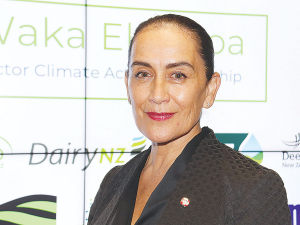Board upheaval at PGW
The board of rural trader PGG Wrightson Limited has agreed to call a special meeting demanded by its largest shareholder.
 Traci Houpapa claims that Māori warrant special consideration, having come to the table with a long tail of deficit.
Traci Houpapa claims that Māori warrant special consideration, having come to the table with a long tail of deficit.
Māori supoort for HWEN may be a key factor in winning government support for the primary sector-led initiative.
The Māori perspective is obvious when reading the narrative in the report. Traci Houpapa, chair of the Federation of Māori Authorities (FOMA), says she supports the recommendations in HWEN. She says, from the very beginning, when the partnership was first proposed, Māori strongly advocated for a Te Ao view, which ties in health and wealth of people as well as the wealth of the land.
"Our preferred stance has always been centred on taiao (the environment)," she told Rural News. "The current profit-driven focus of the primary sector industries carries a significant environmental cost. It is not sustainable and we have pushed for a values-over-value approach."
Houpapa says Māori warrant special consideration, having come to the table with a long tail of deficit.
She says they lost 95% of their land post Treaty and almost 60% of the land they got back is hard hill country, which means that when adverse climatic events occur, Māori farms tend to be disproportionately affected when compared to Pakeha farms.
"It is important to remember that FOMA has vested interests in the performance of all the HWEN signatories," she adds. "As significant levy payers into those industry groups, we expect better performance, participation and better partnership and investment into the Māori climate change adaptation process."
Houpapa says the HWEN report has resulted in a series of valuable wins for Māori farmers, growers and landowners.
The World Wide Sires National All Day Breeds Best Youth Camp Best All Rounder plaudit has become family affair, with 2026 Paramount Cup winner Holly Williams following in her sister Zara's footsteps.
DairyNZ is giving New Zealand farmers a unique opportunity to gain hands-on governance and leadership experience within the dairy sector.
Herd improvement company LIC has posted a 5.2% lift in half-year revenue, thanks to increasing demand for genetics.
According to the latest Fresh Produce Trend Report from United Fresh, 2026 will be a year where fruit and vegetables are shaped by cost pressures, rapid digital adoption, and a renewed focus on wellbeing at home.
The Roar is a highlight of the game hunting calendar in New Zealand, with thousands of hunters set to head for the hills to hunt male stags during March and April.
OPINION: The past few weeks have been tough on farms across the North Island: floods and storms have caused damage and disruption to families and businesses.